This article was originally printed in the Spark December 2010, at a stage when the Workers Party Wellington branch was reconsidering its involvement in Students Assocations. We reprint it now in the lead-up to the VSM bill’s passage on September the 28th and in light of increased student militancy, with significant actions in Auckland and Wellington.
Joel Cosgrove (Wellington Workers Party member and former president of Victoria University Students’ Association).
The Education (Freedom of Association) Amendment Bill is making its way through parliament to make student union membership voluntary. Most people will be totally unaware of the bill and what it means, and may be thinking, “Anyway Freedom of Association is a good thing, isn’t it?”
Background
Currently any student studying at a polytech or university is automatically a member of their student association. A student association levy is generally charged to cover student union running costs, and these range between approximately $75 and $150 per year. Students can opt out of their membership but only upon reasons of hardship or conscientious objection. With a conscientious objection opt-out they are still liable to pay their membership levy.
On-and-off, since the 1970′s, this point of compulsion has waxed and waned as a political issue. Since the 1990s the issue has generally excited the membership of the youth and student wings’ of both the ACT and National parties. National MP Tony Steel brought forward a VSM bill in 1998 that brought about a nationwide referendum in every tertiary institute on the issue of whether student associations would stay “compulsory” or go “voluntary”. The only tertiary institute that went “voluntary” was Auckland University. Many institutes (including Victoria and Otago Universities) voted over 70% to stay “compulsory”. The difference with the current law is that it offers no choice to students on the issue. Funnily enough, students as a whole have voted to remain “compulsory”. “This Bill is an ideological solution in search of a problem. It is bad policy to impose such upheaval and chaos when there are many bigger issues facing the tertiary sector and New Zealand at present,” Said David Do, 2010 Co-President of the New Zealand Union of Students’ Associations. “Generations of students have enjoyed the services and opportunities provided by associations, and this shouldn’t be taken away from future students,” says Pene Delaney the other 2010 NZUSA co-President.
While the co-Presidents are correct, the ‘end of nigh’ predictions put forward are also unlikely to come about. The reality is that the bill is being put forward as an ideological back pat to the ACT Party (whose bill this is) and a sop to the youth wing of the National Party. Compromise was apparently agreed on to make it easier to opt out politically, but fraudulence at the Whitirea Students’ Association – of more than one million dollars – scuppered any compromise and the bill is now being pushed through unchanged. Any talk though of the extinction of Student Associations is premature. Auckland University Students’ Association has been voluntary since 1999 and has survived through grants from the University and from pre-existing business e.g. catering, rental properties etc. This is the model that most Student Associations will follow. It won’t be the end of associations as entities, as they can play a role that is useful to the university in terms of mediating student anger and organising against the ongoing attacks on student conditions. The experience of AUSA (of which David Do was a past-president) is that the university can hold the threat of cuts to student association funding if the student association protests or organises in a way that annoys or threatens the institution. Continue reading “Voluntary Student Membership (VSM) – a socialist perspective”
Fiery scenes at Victoria University as security attack students
[youtube http://www.youtube.com/watch?v=NiYbund_msA]
Over 300 students gathered today to protest ongoing cuts and redundancies at Victoria University this afternoon.
More than one hundred students marched to deliver a letter outlining their concerns to Vice Chancellor Pat Walsh. At that point University security guards blocked access to the students, whose sole intention was to deliver their letter to Walsh or a representative. Security staff proceeded to push students down stairs and punched several in the head.
“I was just trying to slip the letter under Pat’s door; security came up and started trying to push us down stairs. There were people behind us; people could have got hurt if security had actually succeeded. Because of that, they started punching me in the head. I guess they’re not fans of non-violent protests…” Says student Sam Oldham.
A number of current and former students spoke beforehand including a recent PhD graduate, as well as a number of staff. Speakers highlighted issues of course and staff cuts as well as incompetent and short-sighted management running the university into the ground. It was put forward that senior management at VUW have cultivated a culture of fear and intimidation over more than half a decade, with staff fearful of speaking for fear of repercussions.
“I am disgusted that this culture of intimidation at VUW has extended to management condoning and supporting security staff violently attacking students. If we can’t be critical of uni policies and changes, how are meant to act as the critic and conscience of society?” Says postgraduate student Amanda Thomas.
Hundreds of outlines of students were drawn in chalk to represent the death of quality tertiary education. The sheer amount of chalking stopped security from immediately washing out any slogans they disliked, something that had been going on in the preceding two weeks. Security have claimed that chalking is “banned” at VUW.
Students are organising more actions to stop VUW management further damaging the institution. “I’m disappointed in the university, it is supposed to be a critical and creative space, but when we actually use those rights, we’re literally pushed down stairs,” says student Octavia Palmer.
Annette Sykes on Operation 8
[youtube http://www.youtube.com/watch?v=bNG_o3fKsgw]
Marae Investigates on dropped charges for Operation 8 defendants. Mana Party candidate, and lawyer for the defence, Annette Sykes challenges Maori Party MP Te Ururoa Flavell on the failure to act against the Crown: “You work with iwi leaders, you don’t work with the people.”
Mana calls for all remaining charges to be dropped. More of Sykes’ take on iwi corporatism here.
Operation 8: Crown over-reaches
[youtube=http://www.youtube.com/watch?feature=player_embedded&v=lCWsNTRKqdc]
On October 15th, 2007, the Armed Defenders Squad arrested 18 anarchists and Tūhoe, shutting Ruatoki down at gunpoint. On the 8th of November, the Crown dropped the terrorism charges used to justify their arrests. On Tuesday the 6th of September this year, the Crown announced its decision to drop the charges for 13 of the accused, leaving 4 facing “organised crime” charges.
In the last four years, the economic and emotional cost on the defendants has been devastating. While some cast this train-wreck as sheer incompetence, Chris Trotter even demanding sympathy for their legal failure, the Crown and the police clearly intended to shut down dissent. None who support Maori self-determination, or the right to resist oppression in general, can stay quiet about this abuse.
On Monday the 12th of September at 8:30am, 13 of the 17 defendants will be discharged from the Auckland High Court. Supporters are organising a solidarity demo in support of the remaining four. Drop the charges!
Solidarity demo on Facebook
“Operation 8” documentary
GLBT campaigning in Wellington – interview with Queer Avengers
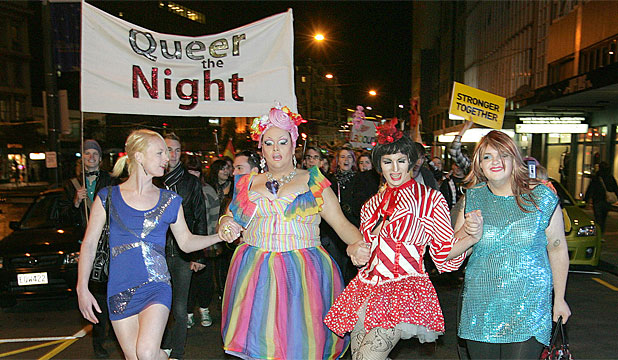
The following interview is with Kassie Hartendorp (Wellington Workers Party branch organiser and Schools Out facilitator and chair of Queer Avengers). And Jason Frock (Wellington Workers Party branch education officer, Schools Out facilitator, and trainee-coordinator of the Wellington Gay Welfare Group and member of the Queer Avengers). Both have been in highly involved in the recent Queer the Night demonstration and in the formation of the Queer Avengers campaign organisation.
The Spark: What was Queer the Night?
KH: Queer the Night was a march organised in response to the day-to-day violence that members of the queer community face while in the streets. The fear of verbal insults and physical attacks is something queers constantly carry with them everywhere.
JF: The streets are especially dangerous places for queers. Twice as much near bars at night which are highly sexualised areas where concepts of ‘masculinity’ need to be protected. They are often impossible to pass without having aninsulthurled your way if you’re visibly gay. It was also becoming normalised in Wellington to have regular queer bashings. Within our own friend networks it was becoming roughly 1 every other month.
KH: The purpose of the march was to call-out the queer community for its general silence towards the pervasive homophobic and transphobic street culture. We wanted people to realise that “enough is enough” and to begin to think about how to collectively organise beyond the march itself and to actually fight our continued oppression.
JF:Homophobic and transphobic violence is something experienced by queer community as a whole, but the responses to it are generally acted upon at an individual level. We wanted to break that atomisation by having a visible, militantand proud march through the centre of town and opening up a place where queers can come together and talk about our social oppression.
KH: What we needed was a celebration, a big bang to break the silence. We needed a powerful event which could break through the general apathy towards collective action. We needed an event which would empower people to take ownership of the queer community.
The Spark: How did the march itself go?
JF and KH: Overwhelming success.
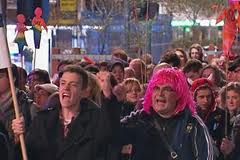 KH: The energy was amazing. For many of us it was the most militant march we’ve been on. There was a good turnout, of about 400 people. The militancy, size and feelwere much greater than the numbers. I’ve been on bigger marches that weren’t nearly as powerful. There were four official guest speakers; all were received well by the crowd. It was a very emotional and raw event. People were crying. Actually making the streets a queer space was a very powerful experience for people.
KH: The energy was amazing. For many of us it was the most militant march we’ve been on. There was a good turnout, of about 400 people. The militancy, size and feelwere much greater than the numbers. I’ve been on bigger marches that weren’t nearly as powerful. There were four official guest speakers; all were received well by the crowd. It was a very emotional and raw event. People were crying. Actually making the streets a queer space was a very powerful experience for people.
Continue reading “GLBT campaigning in Wellington – interview with Queer Avengers”
(Gay) Marriage and (Queer) Marxism
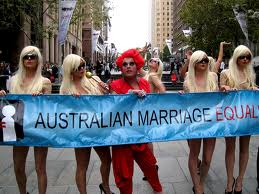 Ian Anderson, Workers Party member
Ian Anderson, Workers Party member
Internationally, demands for gay marriage are galvanising important mass movements. These movements develop from diverse origins: Australia’s Equal Love campaign regularly mobilises thousands, while same-sex marriage is one of the constitutional demands in Nepal’s ongoing revolutionary struggle. In countries such as Sweden and South Africa, activists have achieved the demand for gay marriage; in countries such as New Zealand, activists have achieved an equivalent in the Civil Union Act.
These achievements leave important question marks. The Civil Union Act did not grant adoption rights to same-sex couples; did not grant any rights to polyamorous relationships; both Civil Unions and marriages are fairly uncommon. Ultimately the new status quo leads many in the queer movement back to questioning marriage itself. Activists in Wellington’s newly formed Queer Avengers, which mobilised hundreds for its Queer The Night march, have discussed ‘repeal of the Marriage Act’ as a possible slogan. It’s important in this context to tease out the historical nature of marriage, and the arguments for marriage abolition. Continue reading “(Gay) Marriage and (Queer) Marxism”
Queer The Night speech
Speech by James Froch, key organiser of last night’s Queer The Night march, Schools Out facilitator, Wellington Gay Welfare Group trainee co-ordinator, and Workers Party Wellington Education officer.
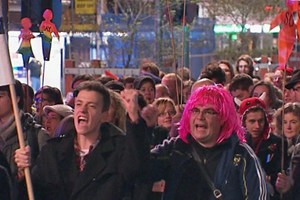
I’m one of the organisers of this march, but I’m also here as an organiser for Schools Out.
Homophobia is something each of us has to live with. We hesitate to hold our partners hand in public because we fear straight people’s reactions, their dumbfounded staring, their screams of dyke or faggot, their fists and their bottles.
Their homophobic actions aim to rein in our various identities and orientations, to keep us off the streets and in the closets. Its intent is to make queer and trans-people live in fear.
We’re here to say we’re not afraid. We’re here to say we stand as a community against homophobia and transphobia. We’re here to fight until everyone has the right to express and explore their queerness without religious, economic, legal restrictions. Continue reading “Queer The Night speech”
Press Release: Double-Down Burger Increases Workload for KFC Staff
 Workers say KFC’s infamous Double Down – a “bunless burger” consisting of chicken fillets, bacon, cheese and a special sauce – is increasing their workload.
Workers say KFC’s infamous Double Down – a “bunless burger” consisting of chicken fillets, bacon, cheese and a special sauce – is increasing their workload.
In Wellington alone, KFC sales increased 100% on the first day of the new promotion, and the product sold out for the first two days running. However, crew-members say the increased productivity has not paid off. Throughout the country there have been instances of customer abuse resulting from sold out product.
“The company’s making massive profits but it’s just making our lives harder,” KFC cook and Workers Party member Ian Anderson says.
Because of the hugely increased demand, many workers are giving up their breaks or working on their day off. “I’m used to being overworked and underpaid,” Ian says, “But when the work-load goes up the poverty wages stay the same.”
“The burger’s also not that amazing.”
90 people attend "Democracy in the Arab world" meeting in Wellington
The following article is by Marika Pratley, PFLP Campaign Co-coordinator for Wellington branch, and first appeared in the April issue of The Spark.
Public meetings and solidarity pickets have been held around New Zealand in solidarity with the people of Egypt in light of the February rebellions against Mubarak. Since then war in Libya has begun, Saudi Arabia has invaded Bahrain, and with so many drastic changes and uncertainties in the Middle East, the rest of the world watches in anticipation for the next events to unfold.
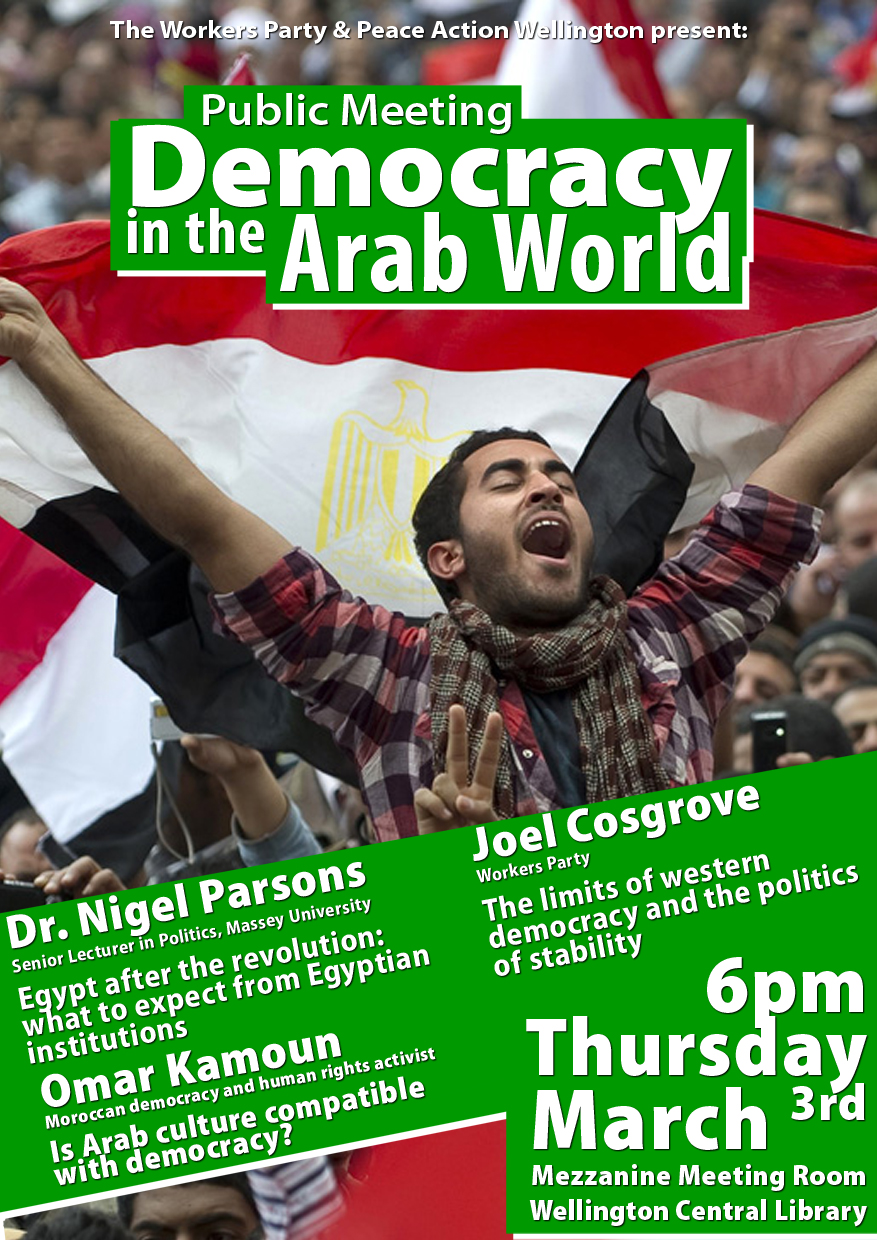 How far will these events advance the interests of those leading the protests? And to what extent can the movement be exploited as a gateway for politicians with similar interests to Mubarak? To address these issues a public meeting organised by Peace Action Wellington and Workers Party was held on March 3 in Wellington. Over 90 people turned up to the event. The main speakers were Dr Nigel Parsons (Political Scientist, Massey University) Joel Cosgrove (The Workers Party and PFLP solidarity campaign) and Omar Kamoun (Wellington Palestine Group).
How far will these events advance the interests of those leading the protests? And to what extent can the movement be exploited as a gateway for politicians with similar interests to Mubarak? To address these issues a public meeting organised by Peace Action Wellington and Workers Party was held on March 3 in Wellington. Over 90 people turned up to the event. The main speakers were Dr Nigel Parsons (Political Scientist, Massey University) Joel Cosgrove (The Workers Party and PFLP solidarity campaign) and Omar Kamoun (Wellington Palestine Group).
Continue reading “90 people attend "Democracy in the Arab world" meeting in Wellington”
Mid East/North Africa rising up: Background
John Edmundson, Workers Party education officer, Christchurch
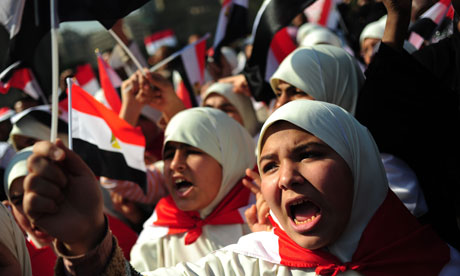 The biggest political story so far in 2011 has been the upsurge in mass protest in the Middle East and North Africa and the changes in government that have already been ushered in in Tunisia and Egypt. Massive demonstrations have shaken Yemen, Bahrain, Libya, Algeria and Jordan. Throughout the Arabic-speaking world, mass movements have emerged, seemingly from nowhere, to challenge long established dictatorial, and largely US-allied regimes that had seemed impervious to change and unthreatened by an apparently passive, depoliticized population. In Libya, civil war has broken out between the rebels, a mix of hastily armed civilians and elements of the army and air force that defected to the revolt, and those military and militia forces that have remained loyal to Libyan leader Col. Muammar Gaddafi. Subsequently of course, Western intervention, in the form of bombardments and airstrikes, has ensued under the pretext of saving civilian lives.
The biggest political story so far in 2011 has been the upsurge in mass protest in the Middle East and North Africa and the changes in government that have already been ushered in in Tunisia and Egypt. Massive demonstrations have shaken Yemen, Bahrain, Libya, Algeria and Jordan. Throughout the Arabic-speaking world, mass movements have emerged, seemingly from nowhere, to challenge long established dictatorial, and largely US-allied regimes that had seemed impervious to change and unthreatened by an apparently passive, depoliticized population. In Libya, civil war has broken out between the rebels, a mix of hastily armed civilians and elements of the army and air force that defected to the revolt, and those military and militia forces that have remained loyal to Libyan leader Col. Muammar Gaddafi. Subsequently of course, Western intervention, in the form of bombardments and airstrikes, has ensued under the pretext of saving civilian lives.
So where did these movements come from, how did they arise so suddenly and what potential significance do they have for the region and for revolutionary movements around the world? Many commentators reacted to the massive demonstrations, especially those in Egypt, with surprise, having long regarded Egypt as one of the most stable countries in the Middle East. US administration insiders cited Libya and Iran as much more likely contenders for popular uprisings. Iran of course has seen a renewal of its popular movement and Libya too was soon to be gripped by protest and violent military repression, but how did the pundits get it so wrong about such dependable US allies as Egypt, Bahrain and Yemen? The situation is changing by the day, or in some cases, by the hour, so any attempt to provide up to date commentary would be futile, but an analysis of the background to these events and their potential significance is possible.
Continue reading “Mid East/North Africa rising up: Background”
